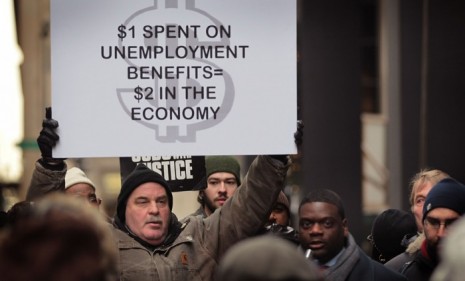Why are there still no new jobs?
Federal Reserve Chairman Ben Bernanke says unemployment may remain painfully high for years to come. Why?

A free daily email with the biggest news stories of the day – and the best features from TheWeek.com
You are now subscribed
Your newsletter sign-up was successful
Ben Bernanke, the chairman of the Federal Reserve, says the nation's unemployment rate — which rose to 9.8 percent in November amid a "major slowdown" in job growth — will likely stay high for years. "At the rate we're going, it could be four, five years before we are back to a more normal unemployment rate," Bernanke told "60 Minutes" in an interview broadcast on Sunday. Why hasn't this economic recovery produced more jobs? And what can be done about it? (Watch Joe Biden respond to the latest jobs report)
The government needs to do more: This isn't a recovery, says Robert Reich in Salon. It's "a continuing jobs emergency," and it's getting worse because the government isn't doing enough. At a minimum, Washington should extend unemployment benefits to help hurting families, who will, in turn, boost the economy by spending the money. The government should also create a new Works Progress Administration to put people to work and cut payroll taxes to give workers "more money in their pockets."
"The American jobs emergency requires action"
The Week
Escape your echo chamber. Get the facts behind the news, plus analysis from multiple perspectives.

Sign up for The Week's Free Newsletters
From our morning news briefing to a weekly Good News Newsletter, get the best of The Week delivered directly to your inbox.
From our morning news briefing to a weekly Good News Newsletter, get the best of The Week delivered directly to your inbox.
Washington's meddling is the problem: The dismal jobless numbers make it clear "that too many tax and regulatory obstacles are blocking satisfactory job creation," says Larry Kudlow in National Review. It will take "fresh new incentives" to "spur the kind of prosperity that Americans desire." That means we need "shock therapy" in the form of "pro-growth" tax cuts and deregulation.
This is just a reminder of how severe the recession was: The Federal Reserve whipped up "bullish sentiment" by promising to unleash another $600 billion to boost the economy, says John Curran in Time. But that couldn't change the "the sluggish nature of this economic recovery." The fact that more than 15 million Americans who wanted work couldn't find jobs merely serves as a "shocking reminder" that the recent recession was deeper than any we had seen in decades.
"The November jobs report disappoints broadly"
A free daily email with the biggest news stories of the day – and the best features from TheWeek.com
But businesses will have to start hiring soon: One reason for the jobless recovery is "the remarkable story of continuously rising U.S. worker productivity," says Joseph Lazzaro in Daily Finance. The pattern was a godsend during the 2007-2009 recession, because it allowed businesses to "maintain output despite layoffs." The "downside" of higher productivity is that it has "delayed job creation," but don't worry — after the "longest period of 'rightsizing' in decades," most companies can't get any leaner, so they'll have to start hiring as soon as sales pick up.
-
 Political cartoons for February 3
Political cartoons for February 3Cartoons Tuesday’s political cartoons include empty seats, the worst of the worst of bunnies, and more
-
 Trump’s Kennedy Center closure plan draws ire
Trump’s Kennedy Center closure plan draws ireSpeed Read Trump said he will close the center for two years for ‘renovations’
-
 Trump's ‘weaponization czar’ demoted at DOJ
Trump's ‘weaponization czar’ demoted at DOJSpeed Read Ed Martin lost his title as assistant attorney general